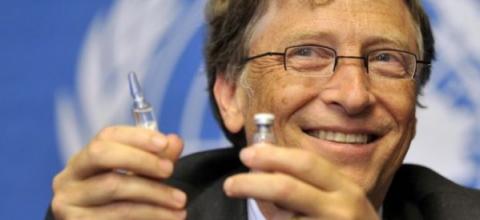Bill Gates And 13 Other Investors Pour $120 Million Into Revolutionary Gene-Editing Startup
Also included in the $120 million funding round (take a deep breath): Deerfield Management, Viking Global Investors, Fidelity Management & Research Company, funds and accounts managed by T. Rowe Price Associates, Inc., Google Ventures, Jennison Associates on behalf of certain clients, Khosla Ventures, EcoR1 Capital, Casdin Capital, Omega Funds, Cowen Private Investments and Alexandria Venture Investments.
“They all appreciate the vast potential of this science,” says Katrine Bosley, the chief executive of Editas. “The heart of the conversation we had with everybody is how you translate this very exciting but young science into treatments, into therapies.”
It’s a big leap for a technology that has yet to even be tried in patients – especially since the intellectual property landscape around CRISPR-Cas9 is treacherous. Jennifer Doudna and Emmanuel Charpentier published the first paper detailing how to use the enzyme to cut DNA. They filed for a patent for using it to edit the DNA of cells with nuclei – like those of plants, animals, and people – too. But Feng Zhang of the Broad Institute filed a separate patent on using it in cells with nuclei, and it was granted first.
Doudna, originally an Editas founder, has licensed her patent to another Cambridge, Mass.-based company, called Intellia. Charpentier has licensed to CRISPR Therapeutics, based in Basel. Zhang’s patent is licensed to Editas.
Jim Flynn, a managing partner at Deerfield Capital Management, says he thinks Editas has a very strong intellectual property position, but that it wasn’t his most important concern. Better to get to market first, he argues, than to have the best IP.
“Your worst case scenario if you’re first to the market with something that is going to create a survival benefit in a population is maybe you have to pay a royalty, maybe there is a cross license,” Flynn says.
Echoes Hans Bishop, the chief executive of Editas’ cancer partner, Juno: “As a company, from a capability side, Editas is the leader.”
Editas CEO Bosley says creating new treatments is her new focus. Other companies are probably already using CRISPR-Cas9 to try and discover new drugs. But Editas is focused on gene therapy, on using viruses or other methods to deliver the CRISPR-Cas9 protein into the cells of sick patients and edit the very DNA that is making them ill.
The first project likely to be tried out in patients, she says, is a treatment for Leber’s congenital amaurosis type 10, a genetic form of blindness. The disease is a good choice for a first attempt at making CRISPR-Cas9 work, she says, because it is in the eye, where gene therapies are easier to deliver, and because it is caused by a single genetic misspelling that can be deleted out. It will be much harder to rewrite genes than to make simple deletions.
Even so, Bosley said, it turned out to be harder to fix LCA-genes in cell culture than Editas scientists expected. The CRISPR simply didn’t cut in the right place, and they had to figure out how to cut the DNA in two places in order to fix the broken gene. She says her team is also working hard on the Juno project. And Editas is working on hemoglobinopathy, a type of genetic condition in which the molecule that carries oxygen in red blood cells is defective. That will be a tougher project: it will involve not just cutting out a DNA misspelling, but actually editing a gene.
All of this could take years, and it could be a long time before there is an initial public offering or sale that would offer the investors a payoff on their investment. Flynn, the Deerfield partner, says he’s happy to wait. His fund, he says, has a 12-year time horizon. “We’re very comfortable we can weather any storm that is likely to come.”
Matthew Herper

